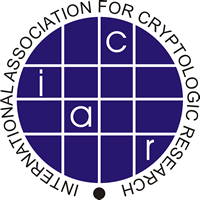Invited Speakers
PKC 2017 is proud to feature the two invited speakers below:
Recent Advances in Non-Malleable Cryptography

Vipul Goyal, Carnegie Mellon University
Abstract:
The field of non-malleable cryptography deals with designing techniques to
defend against tampering attacks and man-in-the-middle attacks. This
includes objects such as non-malleable commitments, encryption, and codes.
This field has moved very rapidly in the last few years and a number of
basic questions have been resolved. These developments have left a footprint
even beyond cryptography to areas such as randomness extraction and
complexity theory. I will survey some of these recent developments and put
forward a number of exciting future directions.
Short bio:
Vipul is an Associate Professor in the Computer Science Department at
Carnegie Mellon. He obtained his PhD from UCLA in 2009 and then was a
researcher in the Cryptography and Complexity group at Microsoft Research
India until joining Carnegie Mellon at the beginning of this year. Vipul is
interested in various aspects of theoretical cryptography (and in
theoretical computer science in general), and he is particularly well known
for his work on concurrent security and on non-malleability. Vipul is
recipient of several prizes and awards, including an ACM CCS Test of Time
Award and a Google Outstanding Graduate Student Award, and he was nominated
by the Forbes magazine as one of the "30 under 30" in the category science
and healthcare in 2013.
The Evolution of Public Key Cryptography in SSL/TLS

Kenny Paterson, Royal Holloway
Abstract:
In this talk, I'll discuss public key cryptography in SSL and TLS,
covering both attacks and positive security results. I'll begin with an
overview of the SSL/TLS Handshake Protocol, an authenticated key exchange
protocol, describing the different modes and some of the advanced features
it supports (including renegotiation and resumption). I'll then discuss
how RSA encryption is used in SSL/TLS, and revisit Bleichenbacher's attack
and its recent reincarnation in the form of the DROWN attack. I'll also
look at the damaging long-term effects of the inclusion of export-grade
cryptography in SSL/TLS in the 1990s, covering the FREAK and LOGJAM
attacks. I'll explain why Diffie-Hellman key exchange has gained
popularity in SSL/TLS in recent years, and cover the deployment of
elliptic curve cryptography in SSL/TLS. I'll also discuss how public key
cryptography will operate in TLS 1.3, a major redesign of the protocol
whose specification is nearing completion in the IETF.
Short bio:
Kenny is a Professor of Information Security at Royal Holloway. He obtained
his Ph.D. from the University of London in 1993 and then spent some time at
ETH Zurich, at Royal Holloway, and at Hewlett-Packard Laboratories Bristol,
before returning back to Royal Holloway in 2001. Kenny is interested in the
theory and practice of cryptography, and he is particularly well known for
his work on analyzing deployed cryptographic systems and developing provably
secure solutions to real-world cryptographic problems. He is co-founder of
the Real World Cryptography series of workshops and co-chair of the irtf.org
Crypto Forum Research Group. Kenny is recipient of several prizes and
awards, including an ACM CCS Best Paper Award, a Google Distinguished Paper
Award, and a PET Award for Outstanding Research in Privacy Enhancing
Technologies.
